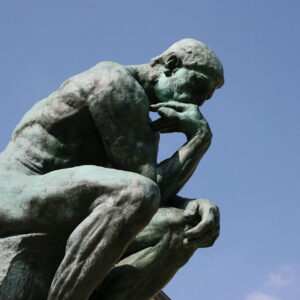In the epic myth, Ramayana, Hanuman is presented as being the intermediary between the world of humanity and that of divinity, a Christ figure. His mother was a monkey, his father was the god of wind. As such, he is part mammal and part divine spirit, just like us. The genius of portraying such a figure as a monkey is that it makes it easier to avoid a great deal of dogma, pretentiousness, and zealotry.
When Hanuman was a baby, he complained to his mother that he was hungry and must have an orange. There were no oranges in the house, so his mom tried to placate him with other foods. Nothing would satisfy Hanuman, however. He demanded he must have an orange. Every parent knows how insistent a little munchkin can be, so his mother said she would go to the market and get him an orange, and he was to stay put until she returned.
Time moves slowly when you have a craving, and Hanuman became increasingly impatient. He looked out of the window and found a big, glowing orange hanging in the sky. Mother’s instructions were cast aside; he flew up and ate the orange.
As might be expected, after Hanuman ate the sun, everything turned dark and all life came to a stark halt. The nearby yogis became aware of the situation and they rushed to Hanuman to implore him to please put the sun back. Fortunately, his mom returned with a replacement orange, so Hanuman acquiesced and the sun was returned.
The yogis consulted amongst themselves and determined that such an event could not be repeated. It’s never a good thing when a baby monkey eats the sun. So, they put a curse on Hanuman that he would forget his powers and believe himself to be a mere mortal, little monkey. The curse worked, and it was a long time before Hanuman remembered himself and his powers.
What does this have to do with you? Simple: you are the same as Hanuman. You are part spirit; divine and free like the wind, and part mammal; hair and bones and stuff. Like Hanuman, your elders put a “curse” on you that you would forget your powers. They were not malevolent, they simply wanted you to fit in as a regular human being. Your immense power would make it hard for you to conform and, with their best intentions, they believed it was good for you to forget. They did not want you to disrupt the regular order of things, so you were taught in a nearly unlimited number of overt and covert ways that you do not have power. And this teaching continues to be reinforced by virtually everyone around you who, themselves, are also under the same spell.
In addition to the curse the yogis placed on Hanuman, they also later arranged for an antidote. The “Hanuman Chalisa,” “40 Verses in Praise of Hanuman,” is a set of mantras that are recited for the purpose of reminding Hanuman of his true identity and vast power. Yogis recite the Hanuman Chalisa as a means of awakening in themselves, and others, the inner Hanuman.
What does all this have to do with life in the world as we know it? We can start by understanding that according to yoga philosophy, there are four great boons in life. We’ll address them individually.
- Kama. Kama literally means “pleasure,” though I think it’s easier understood as “health.” This means a feeling of being comfortable in your own skin. This has become somewhat of a cliché , but there’s a lot to unpack in this phrase. Having a sense of vitality in body and mind enables a vision of life that is much more vibrant than needing to attend to a string of illnesses, aches and pains.
Certainly there are constraints on our physical and mental capacities, and age does bring further limitations. Still, for the large majority of us, being healthy is a matter of attending to the simple necessities: eating moderately, getting regular exercise, spending time in Nature, and keeping our vices to a modest degree.
Speaking of vices, the yoga path is not a proponent of inhibition. The matter is not one of behavior as much as it is what one can integrate. In other words, what your system can enjoy without being harmed. To undo unhealthy habits does not require discipline; it’s more about awareness. If a fan is spinning, you can try to stop it through will power by sticking your hand in the blades. Eventually, however, your arm will grow tired, you’ll drop it, and the fan will spin again. Better to trace the cause of the spinning fan to its source and pull the plug out of the socket. Then the fan stops on its own. Unhealthy habits fall away as the satisfaction of kama becomes increasingly predominant.
- Artha, “prosperity.” This is a feeling of abundance in the fullest sense of the term. Ample wealth, time, and space to engage in the activities and relationships which you find rewarding. To attain this artha, it is helpful to break the mind-set that wealth comes from worldly forces, such as the stock market and other magical dynamics which seem to drive what is called “the economy.”
Artha comes from the divine. Look at Nature, there is no lack in the number of seeds on a tree, grains of sand on a beach, or even mosquitoes in the Vermont forest. When we attune ourselves with this natural abundance, we enter into an energy stream where what is needed for a full and complete life presents itself. It may seem like luck and miracle, until you try it. Then, one becomes aware of patterns of opportunity and resources which are apparent, but hidden, until we open our eyes.
- Dharma. Dharma is harmony, or the fulfillment of one’s purpose. You did not take birth by accident. The circumstances of your arrival here are perfect for your growth and healing. You came here to love, to serve, and to remember.
To love is not easy in a world of selfishness and aggression. This is why so few set their polestar in love’s direction. If we wish to be happy, to know joy, and experience fulfillment, we must make the effort to love. Sometimes it feels like love requires what is unfair; we are asked to give more than we receive. This is accurate. You can either accept love’s requirement or live complaining. You can be right or you can be happy. The choice is yours.
Love cannot be forced and it cannot be faked. Our work is not so much to bring forth love, as it is to seek out our inner obstructions and dissolve them. Then, love spontaneously arises. In this world, there are a practically unlimited number of reasons to withhold love and its greatest expression, forgiveness. But, these are not truly reasons, they are excuses. If we wish to live a charmed, graceful life, we must challenge ourselves to give up our excuses and commit to love. This is the price of admission into the divine world.
With love, a desire to be of some service organically arises. There’s a feeling of sincerely wanting things to be easier for others. Interestingly, one approaches others without a feeling of separation. It’s like the thumb wanting to ensure the other fingers are also doing well; we’re all in this together. There’s no underlying sense of superiority, virtue, or even helping. Just doing what comes naturally.
- Moksha, liberation. Liberation means freedom. Freedom from the feeling of compulsory forces. From a spiritual perspective, this includes the necessity of incarnation as a human being. With moksha, the lessons of human life have been learned; one has graduated from human school. There is no more compulsion to be born as a human, other than the desire to share the fruits of liberation with those still imprisoned.
From a more down-to-earth perspective, moksha means remembering your divine identity. Most people don’t remember who they were before they were born. The very notion even sounds fantastic. Yet, from the yogic perspective, to not remember who you were before you were born is akin to not remembering who you were last night, before you woke this morning.
The forgetfulness of identity prior to birth is called avidya; a spiritual amnesia. The purpose of spiritual practice is to winnow away the cloaks that block remembrance. Practices do not produce moksha because the state of divine freedom is inherent, always present. Like the sun sometimes can’t be seen behind clouds, the truth is blocked by mental agitations and various distractions. None of this changes reality: the sun is always in the sky, your divinity is always present. Still, we need to practice because we are stuck fixating on clouds and fail to see the sun.
I appreciate that much of this may be new information for many people. If so, it may take some time to contemplate and recognize its validity. I assure you, if you do ponder on this with sincerity, the truth will reveal itself. Truth always prevails. It is a seed that once planted will, inevitably and without fail, blossom and flower. On the other hand, there is no duress, no pressure. No yogi will put a gun to your head and insist you adopt a consciousness consistent with enjoying the four boons.
You are welcome to proceed with your life as you choose. We honor and respect your freedom of thought. After reading this, however, you’re kind of stuck — you can never again claim, “no one ever told me.”
Hanuman, like Jesus, made a vow to be with us “until the end of time.” There are great powers at work assisting us in healing, growth, in our spiritual evolution. You can feel them if you are sensitive. It’s not about being prepared or worthy; these great ones are here to help regardless of our ideas of qualification. That’s why it’s called grace; it is unearned but readily available. Accept the help that is offered, awaken your own inner divinity and, like Hanuman, be fully of spirit and of flesh.




